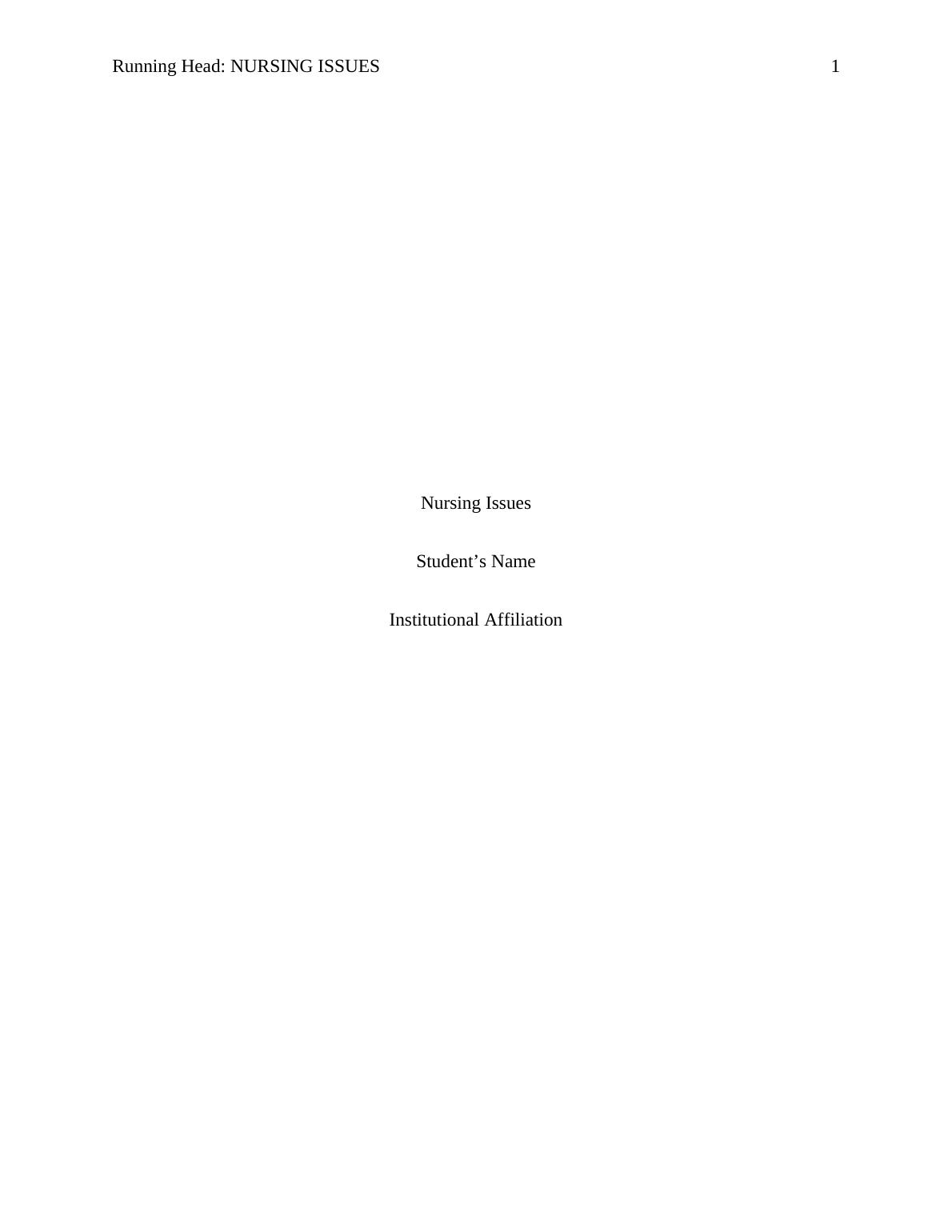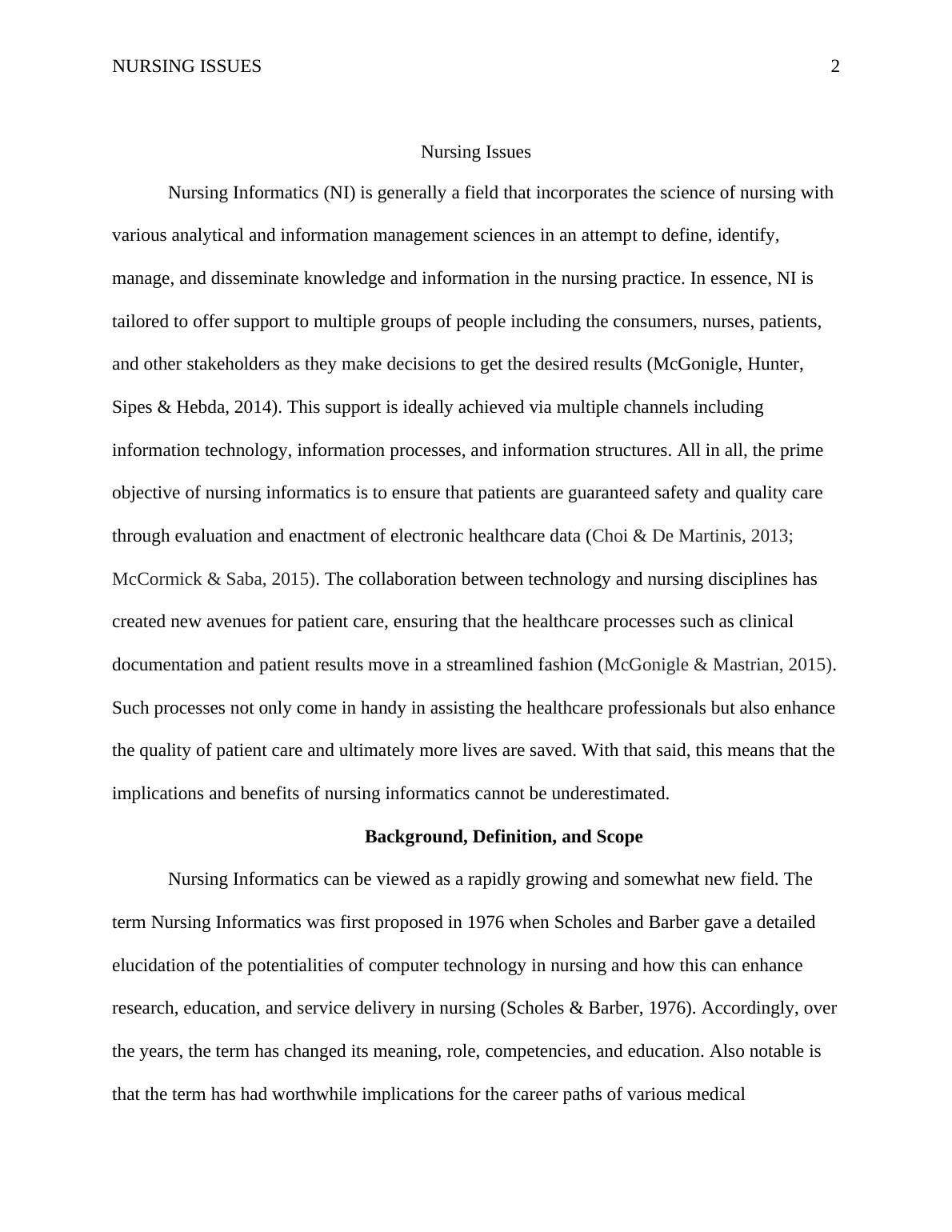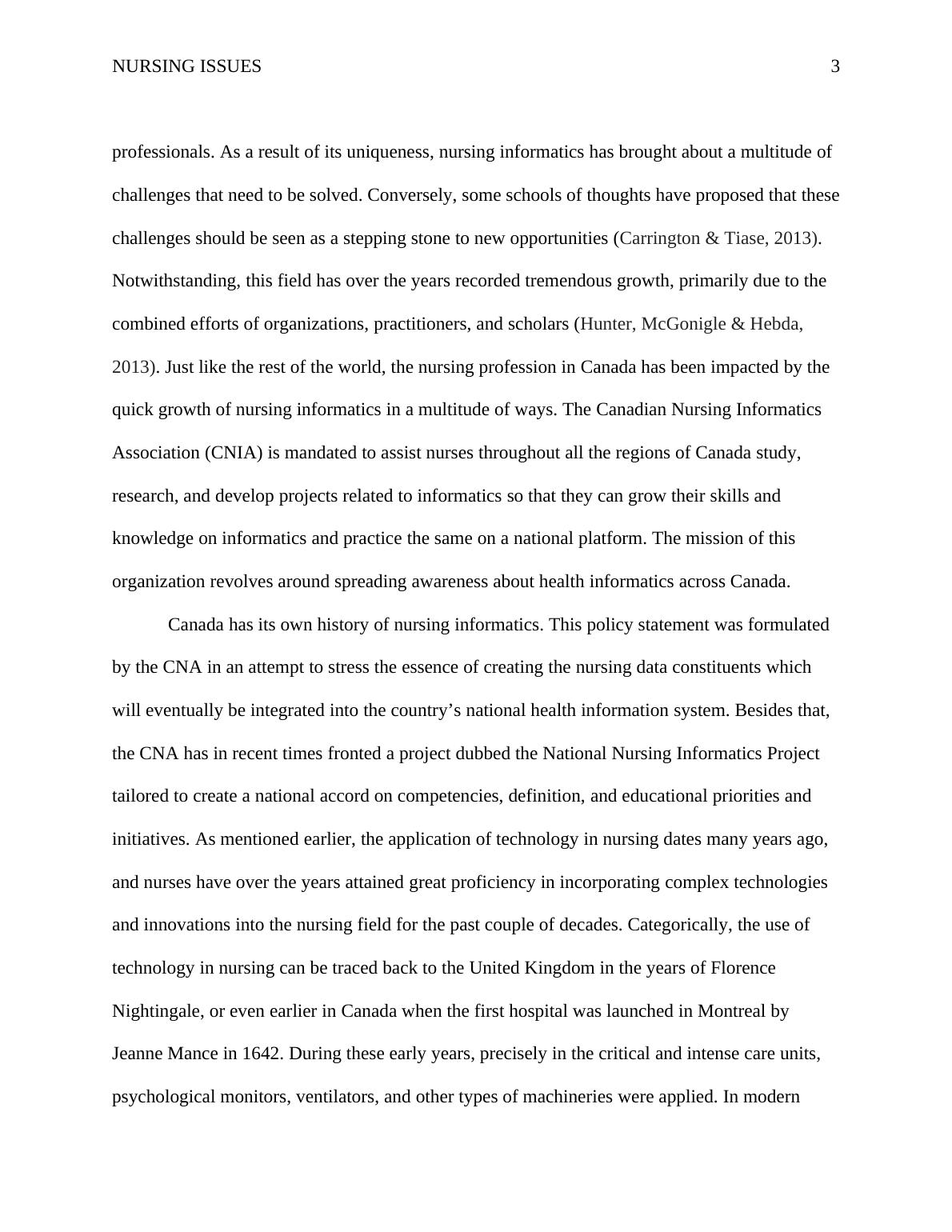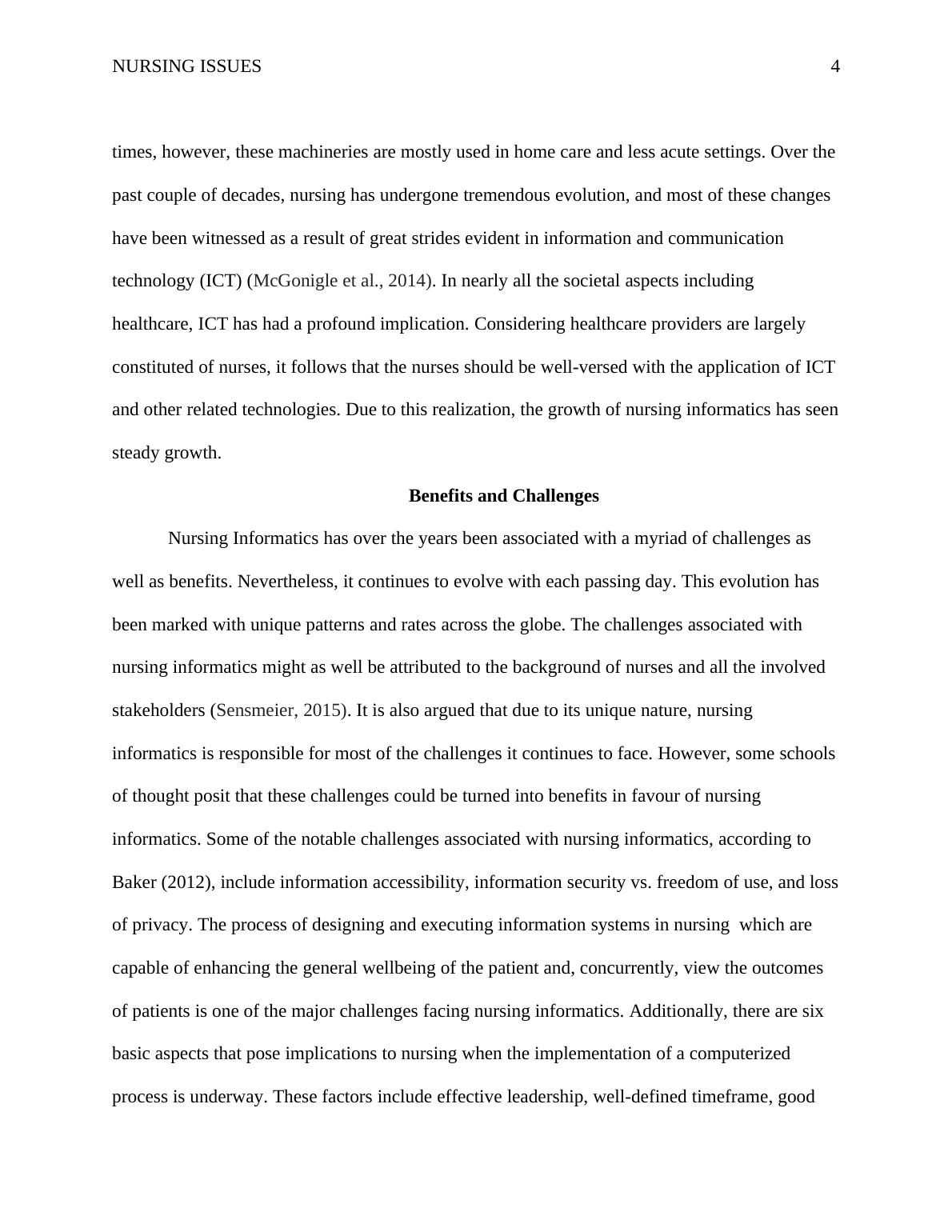Nursing Issues - Benefits, Challenges, and Implications of Nursing Informatics
Added on 2022-11-16
14 Pages4188 Words379 Views
Running Head: NURSING ISSUES 1
Nursing Issues
Student’s Name
Institutional Affiliation
Nursing Issues
Student’s Name
Institutional Affiliation

NURSING ISSUES 2
Nursing Issues
Nursing Informatics (NI) is generally a field that incorporates the science of nursing with
various analytical and information management sciences in an attempt to define, identify,
manage, and disseminate knowledge and information in the nursing practice. In essence, NI is
tailored to offer support to multiple groups of people including the consumers, nurses, patients,
and other stakeholders as they make decisions to get the desired results (McGonigle, Hunter,
Sipes & Hebda, 2014). This support is ideally achieved via multiple channels including
information technology, information processes, and information structures. All in all, the prime
objective of nursing informatics is to ensure that patients are guaranteed safety and quality care
through evaluation and enactment of electronic healthcare data (Choi & De Martinis, 2013;
McCormick & Saba, 2015). The collaboration between technology and nursing disciplines has
created new avenues for patient care, ensuring that the healthcare processes such as clinical
documentation and patient results move in a streamlined fashion (McGonigle & Mastrian, 2015).
Such processes not only come in handy in assisting the healthcare professionals but also enhance
the quality of patient care and ultimately more lives are saved. With that said, this means that the
implications and benefits of nursing informatics cannot be underestimated.
Background, Definition, and Scope
Nursing Informatics can be viewed as a rapidly growing and somewhat new field. The
term Nursing Informatics was first proposed in 1976 when Scholes and Barber gave a detailed
elucidation of the potentialities of computer technology in nursing and how this can enhance
research, education, and service delivery in nursing (Scholes & Barber, 1976). Accordingly, over
the years, the term has changed its meaning, role, competencies, and education. Also notable is
that the term has had worthwhile implications for the career paths of various medical
Nursing Issues
Nursing Informatics (NI) is generally a field that incorporates the science of nursing with
various analytical and information management sciences in an attempt to define, identify,
manage, and disseminate knowledge and information in the nursing practice. In essence, NI is
tailored to offer support to multiple groups of people including the consumers, nurses, patients,
and other stakeholders as they make decisions to get the desired results (McGonigle, Hunter,
Sipes & Hebda, 2014). This support is ideally achieved via multiple channels including
information technology, information processes, and information structures. All in all, the prime
objective of nursing informatics is to ensure that patients are guaranteed safety and quality care
through evaluation and enactment of electronic healthcare data (Choi & De Martinis, 2013;
McCormick & Saba, 2015). The collaboration between technology and nursing disciplines has
created new avenues for patient care, ensuring that the healthcare processes such as clinical
documentation and patient results move in a streamlined fashion (McGonigle & Mastrian, 2015).
Such processes not only come in handy in assisting the healthcare professionals but also enhance
the quality of patient care and ultimately more lives are saved. With that said, this means that the
implications and benefits of nursing informatics cannot be underestimated.
Background, Definition, and Scope
Nursing Informatics can be viewed as a rapidly growing and somewhat new field. The
term Nursing Informatics was first proposed in 1976 when Scholes and Barber gave a detailed
elucidation of the potentialities of computer technology in nursing and how this can enhance
research, education, and service delivery in nursing (Scholes & Barber, 1976). Accordingly, over
the years, the term has changed its meaning, role, competencies, and education. Also notable is
that the term has had worthwhile implications for the career paths of various medical

NURSING ISSUES 3
professionals. As a result of its uniqueness, nursing informatics has brought about a multitude of
challenges that need to be solved. Conversely, some schools of thoughts have proposed that these
challenges should be seen as a stepping stone to new opportunities (Carrington & Tiase, 2013).
Notwithstanding, this field has over the years recorded tremendous growth, primarily due to the
combined efforts of organizations, practitioners, and scholars (Hunter, McGonigle & Hebda,
2013). Just like the rest of the world, the nursing profession in Canada has been impacted by the
quick growth of nursing informatics in a multitude of ways. The Canadian Nursing Informatics
Association (CNIA) is mandated to assist nurses throughout all the regions of Canada study,
research, and develop projects related to informatics so that they can grow their skills and
knowledge on informatics and practice the same on a national platform. The mission of this
organization revolves around spreading awareness about health informatics across Canada.
Canada has its own history of nursing informatics. This policy statement was formulated
by the CNA in an attempt to stress the essence of creating the nursing data constituents which
will eventually be integrated into the country’s national health information system. Besides that,
the CNA has in recent times fronted a project dubbed the National Nursing Informatics Project
tailored to create a national accord on competencies, definition, and educational priorities and
initiatives. As mentioned earlier, the application of technology in nursing dates many years ago,
and nurses have over the years attained great proficiency in incorporating complex technologies
and innovations into the nursing field for the past couple of decades. Categorically, the use of
technology in nursing can be traced back to the United Kingdom in the years of Florence
Nightingale, or even earlier in Canada when the first hospital was launched in Montreal by
Jeanne Mance in 1642. During these early years, precisely in the critical and intense care units,
psychological monitors, ventilators, and other types of machineries were applied. In modern
professionals. As a result of its uniqueness, nursing informatics has brought about a multitude of
challenges that need to be solved. Conversely, some schools of thoughts have proposed that these
challenges should be seen as a stepping stone to new opportunities (Carrington & Tiase, 2013).
Notwithstanding, this field has over the years recorded tremendous growth, primarily due to the
combined efforts of organizations, practitioners, and scholars (Hunter, McGonigle & Hebda,
2013). Just like the rest of the world, the nursing profession in Canada has been impacted by the
quick growth of nursing informatics in a multitude of ways. The Canadian Nursing Informatics
Association (CNIA) is mandated to assist nurses throughout all the regions of Canada study,
research, and develop projects related to informatics so that they can grow their skills and
knowledge on informatics and practice the same on a national platform. The mission of this
organization revolves around spreading awareness about health informatics across Canada.
Canada has its own history of nursing informatics. This policy statement was formulated
by the CNA in an attempt to stress the essence of creating the nursing data constituents which
will eventually be integrated into the country’s national health information system. Besides that,
the CNA has in recent times fronted a project dubbed the National Nursing Informatics Project
tailored to create a national accord on competencies, definition, and educational priorities and
initiatives. As mentioned earlier, the application of technology in nursing dates many years ago,
and nurses have over the years attained great proficiency in incorporating complex technologies
and innovations into the nursing field for the past couple of decades. Categorically, the use of
technology in nursing can be traced back to the United Kingdom in the years of Florence
Nightingale, or even earlier in Canada when the first hospital was launched in Montreal by
Jeanne Mance in 1642. During these early years, precisely in the critical and intense care units,
psychological monitors, ventilators, and other types of machineries were applied. In modern

NURSING ISSUES 4
times, however, these machineries are mostly used in home care and less acute settings. Over the
past couple of decades, nursing has undergone tremendous evolution, and most of these changes
have been witnessed as a result of great strides evident in information and communication
technology (ICT) (McGonigle et al., 2014). In nearly all the societal aspects including
healthcare, ICT has had a profound implication. Considering healthcare providers are largely
constituted of nurses, it follows that the nurses should be well-versed with the application of ICT
and other related technologies. Due to this realization, the growth of nursing informatics has seen
steady growth.
Benefits and Challenges
Nursing Informatics has over the years been associated with a myriad of challenges as
well as benefits. Nevertheless, it continues to evolve with each passing day. This evolution has
been marked with unique patterns and rates across the globe. The challenges associated with
nursing informatics might as well be attributed to the background of nurses and all the involved
stakeholders (Sensmeier, 2015). It is also argued that due to its unique nature, nursing
informatics is responsible for most of the challenges it continues to face. However, some schools
of thought posit that these challenges could be turned into benefits in favour of nursing
informatics. Some of the notable challenges associated with nursing informatics, according to
Baker (2012), include information accessibility, information security vs. freedom of use, and loss
of privacy. The process of designing and executing information systems in nursing which are
capable of enhancing the general wellbeing of the patient and, concurrently, view the outcomes
of patients is one of the major challenges facing nursing informatics. Additionally, there are six
basic aspects that pose implications to nursing when the implementation of a computerized
process is underway. These factors include effective leadership, well-defined timeframe, good
times, however, these machineries are mostly used in home care and less acute settings. Over the
past couple of decades, nursing has undergone tremendous evolution, and most of these changes
have been witnessed as a result of great strides evident in information and communication
technology (ICT) (McGonigle et al., 2014). In nearly all the societal aspects including
healthcare, ICT has had a profound implication. Considering healthcare providers are largely
constituted of nurses, it follows that the nurses should be well-versed with the application of ICT
and other related technologies. Due to this realization, the growth of nursing informatics has seen
steady growth.
Benefits and Challenges
Nursing Informatics has over the years been associated with a myriad of challenges as
well as benefits. Nevertheless, it continues to evolve with each passing day. This evolution has
been marked with unique patterns and rates across the globe. The challenges associated with
nursing informatics might as well be attributed to the background of nurses and all the involved
stakeholders (Sensmeier, 2015). It is also argued that due to its unique nature, nursing
informatics is responsible for most of the challenges it continues to face. However, some schools
of thought posit that these challenges could be turned into benefits in favour of nursing
informatics. Some of the notable challenges associated with nursing informatics, according to
Baker (2012), include information accessibility, information security vs. freedom of use, and loss
of privacy. The process of designing and executing information systems in nursing which are
capable of enhancing the general wellbeing of the patient and, concurrently, view the outcomes
of patients is one of the major challenges facing nursing informatics. Additionally, there are six
basic aspects that pose implications to nursing when the implementation of a computerized
process is underway. These factors include effective leadership, well-defined timeframe, good

End of preview
Want to access all the pages? Upload your documents or become a member.
Related Documents
The Nurse Leader as Knowledge Workerlg...
|1
|689
|74
Nursing Experiences with EHR: Impact, Ethical Issues, and Recommendationslg...
|3
|767
|179
Health Informatics Technology Assignmentlg...
|9
|965
|41
Nursing Informatics Assignment Reportlg...
|5
|898
|13